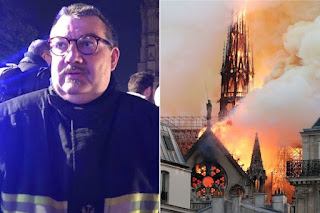On April 15 on this year (2019), the Cathedral of Notre Dame in Paris burst into flames. As the fire was blazing on the roof of this remarkable church, imperiling the entire structure and the life anyone who entered, the chaplain of the Paris fire brigade, Father Jean-Marc Fournier, rushed in. I want to share with you in his own words what he did and why:
As soon as I arrived, there were two things that it struck me as absolutely essential to recover: firstly, the invaluable treasure that is the Crown of Thorns, then, of course, Jesus, present in the Blessed Sacrament. Everyone understands that the Crown of Thorns is this precious, extraordinary relic, but the Blessed Sacrament is our Lord made flesh... you'll understand it's difficult to see someone you love perish in flames.
He describes standing alone in the cathedral "surrounded by
flames, fire and smoldering objects falling from the ceiling" as he
rescued this relic and the consecrated Eucharist.[1] Can you imagine? You may think, how could anyone possibly risk
their life for the Eucharist? There are
more than 200,000 Catholic parishes in the world and more than 400,000 priests,
most with mass offered daily. By that measure,
the Eucharist is not exactly a scarce commodity. While this is true, each of those altars and
tabernacles carries the real body of our Lord made flesh, as Fr. Fournier
said. It is not scarce, but is incredibly precious—indeed, the most
precious thing in the world—yet offered to all who come, free of charge, every
day. If it is worth rushing into a fire
to rescue, isn’t it worth us going to mass to receive?
Why should we believe in
the Real Presence of Christ in the Eucharist as Catholics understand it? Every Christian makes decisions on which of
Jesus’ words to take literally and which to take figuratively or
‘spiritually.’ St. Francis, for example,
read Matthew 19:21, in a way that few of us are willing or able to: “sell your
possessions, give to the poor …then, come follow me.” A key passage that Catholics (and Orthodox)
have taken very seriously and indeed, literally for two thousand years of
history is John 6:53, “Unless you eat my body and drink my blood, there is no
life in you.”
In this so-called
Bread of Life discourse (John 6), Jesus had every opportunity to explain that
he was speaking figuratively, but again and again he doubles and triples down
on the unequivocal meaning of actually ‘gnawing’ on his flesh and consuming his
blood: “For my flesh is true food, and my blood is true drink. Whoever eats my flesh and drinks my blood
remains in me and I in him” (6:55-56) [see Grodi for the ‘winnowing effect’ in
this discourse]. Jesus himself makes
strong, repeated statements about the real identification of the bread and wine
with his body and blood and his continued presence in the breaking of the bread
whenever it is celebrated. This is a
profoundly Biblical idea that is prefigured by the Exodus and temple sacrifices. I do not have space to develop those ideas
here.
The belief in the
Real Presence was held by the earliest followers of Jesus—see the Didache,
Ignatius of Antioch, Polycarp, and Justin Martyr—people who knew the
Apostles. They saw in the Last Supper
and their encounter at Emmaus an injunction to celebrate the Eucharist and to
‘discern the body’ present there, as Paul instructs in 1st
Corinthians.
This belief has
continued to be held by all Christians for fifteen centuries, until Protestant
reformers challenged it in Western Christianity. I think the onus is actually on Protestants
to demonstrate that it is not the
authentic belief and practice of Christ and His Church.
[1]Willis, Ella and Ailbhe Rea,
“Revealed: hero fire brigade chaplain paused to give a blessing as he rescued
priceless relics from Notre Dame flames.” Daily
Standard. 17 April 2019 https://www.standard.co.uk/news/world/revealed-hero-fire-brigade-chaplain-paused-to-give-a-blessing-as-he-rescued-priceless-relics-from-a4120501.html

Comments
Post a Comment